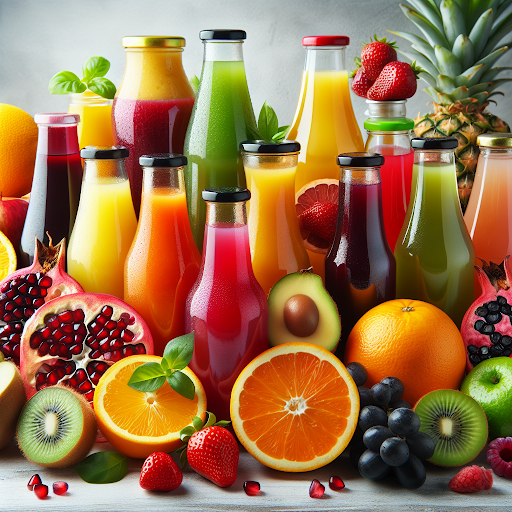
A Symphony of Flavors: Exploring Different Types of Fruit Juices
- 0
As a nutritionist and a juice enthusiast with a penchant for bananas, I’m excited to guide you through the delightful world of “Types of Fruit Juices.” In this comprehensive journey, we will explore a variety of fruit juices, their unique nutritional profiles, and the countless ways they contribute to a healthy and delicious lifestyle. Join me as we sip and savor the diverse flavors nature has to offer.
The Rainbow of Fruit Juices: Exploring Nature’s Palette
Fruit juices, with their vibrant colors and diverse flavors, create a delightful rainbow of options that cater to various tastes and nutritional needs. Let’s dive into the world of fruit juices, exploring the unique characteristics and health benefits of each hue.
Citrus Juices: Bursting with Vitamin C
Citrus juices, with their sunny hues and tangy notes, are renowned for their refreshing taste and immune-boosting properties.
Orange Juice:
Orange juice is a classic favorite, brimming with vitamin C, natural sugars, and flavonoids. These compounds not only support the immune system but also contribute to overall cardiovascular health.
Grapefruit Juice:
With its slightly bitter and tart profile, grapefruit juice introduces naringin and hesperidin, antioxidants known for their potential anti-inflammatory effects. The lower natural sugar content makes it a wise choice for those mindful of their sugar intake.
Lemon Juice:
Lemon juice, though low in calories, packs a punch of vitamin C and citric acid. Its refreshing taste makes it a versatile addition to both beverages and culinary creations.
Nutritional Comparison of Citrus Juices (Per 8 oz. Serving)
Juice |
Calories Vitamin C |
Natural Sugars |
Antioxidants |
Orange |
110 |
70mg 20g |
Flavonoids |
Grapefruit |
52 |
38mg 8g |
Naringin, Hesperidin |
Lemon |
7 |
20mg 1g |
Citric Acid, Limonoids |
Berry Juices: Antioxidant Powerhouses
Berry juices, with their rich colors and sweet-tart flavors, offer a symphony of antioxidants and health benefits.
Blueberry Juice:
Blueberries, known for their high antioxidant content, bring anthocyanins and quercetin to the mix. These compounds have been linked to improved cognitive function and heart health.
Raspberry Juice:
Raspberry juice is a fiber-rich option, offering both antioxidants like ellagic acid and quercetin. The combination contributes to the potential anti-inflammatory and anti-cancer properties of raspberries.
Strawberry Juice:
Strawberries, bursting with vitamin C and anthocyanins, provide a deliciously sweet option that supports skin health and may reduce oxidative stress.
Nutritional Comparison of Berry Juices (Per 8 oz. Serving)
Juice |
Calories Fiber |
Vitamin C |
Antioxidants |
Blueberry |
85 |
2.4g 14mg |
Anthocyanins, Quercetin |
Raspberry |
64 |
8g 32mg |
Ellagic Acid, Quercetin |
Strawberry |
60 |
3g 98mg |
Anthocyanins, Ellagic Acid |
Tropical Juices: Exotic and Nutrient-Rich
Tropical juices, with their bold and exotic flavors, transport you to a paradise of nutrients and refreshment.
Pineapple Juice:
Pineapple juice is not only a tropical delight but also a source of bromelain, an enzyme with anti-inflammatory properties. Rich in vitamin C and manganese, it contributes to immune support and bone health.
Mango Juice:
Mango juice, with its luscious sweetness, delivers a burst of vitamin A and E, promoting skin health and providing essential antioxidants. Its vibrant flavor adds a tropical twist to any juice blend.
Papaya Juice:
Papaya juice, loaded with vitamin C and papain (an enzyme aiding digestion), offers a refreshing and digestive-friendly option. The enzyme papain is known for its potential anti-inflammatory and healing properties.
Nutritional Comparison of Tropical Juices (Per 8 oz. Serving)
Juice |
Calories Vitamin C |
Natural Sugars |
Nutrients |
Pineapple |
83 |
79 mg 16g |
Bromelain, Manganese |
Mango |
100 |
60mg 25g |
Vitamin A, Vitamin E |
Papaya |
59 |
88 mg 11g |
Papain, Folate |
Apple and Pear Juices: Classic and Comforting
Apple and pear juices, with their familiar flavors, provide a sense of comfort while delivering essential nutrients.
Apple Juice:
Apple juice, a timeless classic, contains quercetin and pectin, supporting heart health and aiding digestion. While it is naturally sweet, choosing an unprocessed, 100% juice ensures you enjoy the full nutritional benefits.
Pear Juice:
Pear juice, with its subtle sweetness, is a good source of dietary fiber and vitamin C. The combination of fiber and antioxidants makes it a refreshing and health-conscious choice.
Nutritional Comparison of Apple and Pear Juices (Per 8 oz. Serving)
Juice |
Calories Fiber |
Natural Sugars |
Nutrients |
Apple |
114 |
0.5g 24g |
Quercetin, Pectin |
Pear |
120 |
7g 22g |
Dietary Fiber, Vitamin C |
Vegetable Juices: Green Goodness
Green vegetable juices, often overlooked but nutritionally potent, bring a burst of vitamins, minerals, and a vibrant hue to the juice spectrum.
Carrot Juice:
Carrot juice, with its bright orange color, is rich in beta-carotene, which converts to vitamin A. This nutrient promotes eye health and supports the immune system.
Spinach Juice:
Spinach juice, a green powerhouse, is an excellent source of iron, vitamin K, and antioxidants. Its mild flavor makes it an easy addition to various juice blends.
Beet Juice:
Beet juice, with its deep red hue, contains betaine and folate. These compounds contribute to liver health, cardiovascular well-being, and may aid in detoxification.
Nutritional Comparison of Vegetable Juices (Per 8 oz. Serving)
Juice |
Calories Fiber |
Vitamin A |
Nutrients |
Carrot |
94 |
2g |
457 mcg Beta-Carotene, Potassium |
Spinach |
41 |
0.7g 2813 mcg |
Iron, Vitamin K |
Beet |
70 |
2g |
442 mcg Betaine, Folate |
FAQ Section:
Q1: Are fruit juices high in natural sugars?
A1: While fruits contain natural sugars, consuming whole fruits or choosing juices with no added sugars ensures you benefit from the fruit’s nutritional package.
Q2: Can fruit juices be part of a weight-loss diet?
A2: Moderation is key. Opt for freshly squeezed or 100% pure fruit juices without added sugars, and consider diluting them with water or blending with whole fruits and vegetables.
Q3: Are there specific fruits or vegetables recommended for homemade juice blends?
A3: Absolutely! Fruits like berries, citrus, apples, and vegetables like carrots, spinach, and beets make excellent choices for homemade juice blends.
Q4: Can I combine different fruit juices for a customized flavor?
A4: Certainly! Experimenting with combinations like a berry-citrus fusion or a tropical medley allows you to create unique and delicious blends.
Exploring Banana pH: Adding a Twist to Your Juices
As a banana enthusiast, I must mention the pH level of bananas, ranging from 4.5 to 5.2. Incorporating bananas into your fruit juices not only enhances the flavor but also introduces potassium, vitamin C, and a touch of natural sweetness.
Conclusion:
The world of fruit juices is a vibrant tapestry of flavors and nutrients waiting to be explored. From the zesty citrus to the antioxidant-rich berries, the tropical delights, classic apple, pear, and the green goodness of vegetables, each juice offers a unique nutritional profile. As you embark on your juicing journey, savor the diversity and goodness each type of fruit juice brings to your glass. Here’s to a symphony of flavors and a healthier, more refreshing you!





